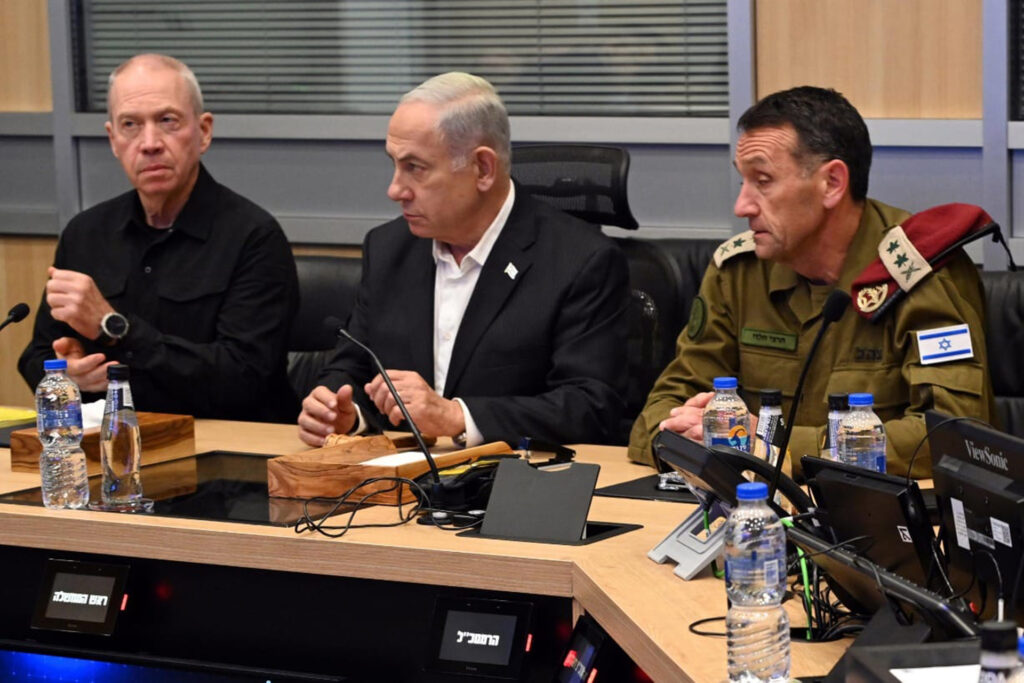10/11/2024–|Last updated: 10/11/202403:09 PM (Mecca time)
The Israeli Cabinet for Security and Political Affairs postponed a vote on the date and objectives of the expected Israeli attack on Iran, according to what Israeli media reported.
The Israeli Broadcasting Authority said on Friday that the cabinet did not reach a concrete decision regarding the attack on Iran during the discussion held during the night hours (Thursday evening).
She added that the Israeli mini-ministerial council did not vote yesterday on the broad outlines regarding the response to Iran’s missile attack or even on delegating decision-making to Israeli Prime Minister Benjamin Netanyahu and Israeli Defense Minister Yoav Galant.
Media outlets quoted a security source as saying that there was a tendency not to vote on the response and to postpone it for approval as the operation was about to be implemented.
It is also likely that Defense Minister Yoav Gallant’s travel to Washington will be postponed again as long as the mini-ministerial council does not make decisions regarding the date of response.
A few days ago, Netanyahu set conditions for Gallant’s visit to the United States, and explained to him that the trip would not be possible until he himself spoke with Biden, and after the cabinet agreed on the nature of the response against Iran.
Subsequently, Gallant’s office announced that, at the request of the Prime Minister, the Minister postponed his trip last night until after the political conversation between the Prime Minister and the US President.
Also in this context, the Ynet news website said that the cabinet discussed the issue of the strike, but refrained from making decisions.
The website explained that the cabinet discussed a number of issues for approximately 4 hours, including the planned Israeli response in Iran.
Disagreements regarding response to Iran
Meanwhile, the Israeli Walla website reported – quoting an American official whom he described as high-ranking – that the United States’ concern about the Israeli response to Iran had diminished.
The website quoted another American official as saying that things are moving in the right direction.
This official added to the site that the differences between the United States and Israel regarding the response to Iran have narrowed, but the response that Israel is planning is still a little more severe than what the White House would like to see.
For his part, Pentagon spokesman Patrick Ryder said that Washington is continuing discussions with the Israelis regarding what he called their broader effort against Hezbollah, taking into account the need to prevent further escalation throughout the region, or the outbreak of a broader regional conflict.
Iranian nuclear
On the other hand, two American officials told Reuters that the United States still believes that Iran has not yet decided to manufacture a nuclear weapon, even with recent developments.
These statements were made by a senior official in the administration of US President Joe Biden, and a spokesman for the Office of the Director of National Intelligence, joining CIA Director William Burns, who said earlier in the week that the United States does not see any evidence that the Iranian leader has… He reversed his decision in 2003 to suspend the nuclear weapons program.
A spokesman for the US Director of National Intelligence’s office said, “We believe that the Supreme Leader (Ayatollah Ali Khamenei) has not made a decision to resume the nuclear weapons program, which Iran suspended in 2003.”
This intelligence assessment could help explain US opposition to any Israeli strike on Iran’s nuclear program in response to Tehran’s ballistic missile attack on Israel last week.
Biden stated after that attack that he would not support an Israeli strike on Iranian nuclear sites, but he did not explain the reason for this decision. His statements sparked strong criticism from Republicans, including former President Donald Trump.
US officials have repeatedly said that trying to destroy Iran’s nuclear weapons program would only delay Tehran’s efforts to develop a nuclear bomb, and may even increase Tehran’s determination to manufacture one.
“We are all monitoring this matter very closely,” the Biden administration official said.
Iran’s mission to the United Nations in New York has not yet responded to a request for comment, but Tehran has repeatedly denied having a nuclear weapons program.

